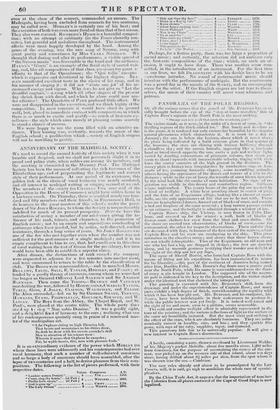ANNIVERSARY OF THE MADRIGAL SOCIETY.
Ws: used to record the annual festivity of this society when it was humble and despised, and we shall not perversely slight it in its proud and palmy state, when nobles are among its members, and the meeting is chronicled in the Mornin!,, The Madrigal Society has been the means of collecting the rich treasures of the Elizabethan age, and of perpetuating the legitimate and correct style of their performance. At one period of its existence, this golden link in the chain of vocal harmony was nearly sundered, and all interest in madrigal writing or singing seemed at an end. The members of the society (as Clxiti.Es Fox once said of the Opposition in the house of Commons) might have ridden home in a hackney-coach. On Thursday, there as-ambled nearly one hun- dred and fifty members and their friends, in Freemason's Hall, to do homage to the great masters of this school ; under the presi- dency of Sir Jon N ROGERS, to whom the Society is unquestionably indebted fOr much of its present prosperity. Hem we have the satisfaction of seeing a member of our aristocracy giving the in- fluence of his rank, talents, and character, to the promotion of English music ; not by an empty and supercilious vouchsafing of patronage when least needed, but by active, well-directed, cordial assistance, through a long series of years. SirJoltN RooERs was one of the few who met together even when the number was not sufficient for the performance of a single madrigal ; and it is no empty compliment to him to say, that, had excellence in this class of vocal writing been the test of fitness for the presidency, few men would have been able to establish a superior claim.
After dinner, the distinctions of rank ceased : the company were requested to adjourn fur a few minutes into another room, and were summoned to return to the table by the classification of clefs. The Basses were summoned first,—and in marched Messrs. BELLAMY, LEETE, SALE, E. TAYLOR, HORSLEY, and Runty; at- tended by a goodly throng of amateurs, among whom we remarked (no longer as General Oflimrs) Lord SALTOUN and Sir ANDREW BARNARD. Then came the Tenors,—BaxriAm and VAUGHAN marshalling the way, followed by Hoitivc ASTLE, C H ARLES Tx V1.0a, TVRLE, Goss, J. JOLLY, CLIFTON, WALMISLEY, and ELLIOT. The Altos succeeded,—led on by Sir GEORGE SMART, TERR 511., HAWKINS, EVANS, F1TZWILLIAM, GOULDEN, SPENCER, and AV. LINLEY. The Boys from the Abbey. the Chapel Royal, and St. Paul's, were placed at the centre table. The whole party then steed up t i sing " Non nobis Domine." It was a goodly sight, and a delightful feast of harmony to the ears ; realizing what one of his contemporaries quaintly sung in praise of a renowned mas- ter of the madrigalian art.
" Like Orpheus sitting on high Thracian That beasts and mountaines to his ditties drew,
So cloth he draw with his sweete musieke's skill Men to attention of his science trew : Wherein it seems that Orpheus he exceedes;
For, he wylde beasts, this, men with pleasure feeds."
It is an extraordinary evidence of the power which MORLEY (to whom these lines were addressed) and his contemporaries had over vocal harmony, that such a number of well-educated musicians and so large a body of amateurs should have assembled, after the lapse of two centuries and a halt; to derive pleasure from their com- positions. The following is the list of pieces performed, with their
respective dates.
Voices. Composers.
" Laudate nomen Pomini" 4 Tye 1553. " Come, clap thy hands,"..1st Part 15 WEELKES 1608.
" Phillis hat h sworn;'.... 2d Part j
" God is gone up" 4 CROFT 1724. "The Lady Grimm" 6 . %mitt 1601. " Ilide not thou thy face I" 4 FAHRAINT 1570. " Down in a &Wry vale" 4 1..TA 1541. " Kyrie eleison " 5 .. . CLAM 1721. " Sweet houcy.sucking bees" 5 WILIIVE 1609. " Swart Philoine1" 5 WARD 1613. " New is my Clods" 5 WEEMS ES 1608. " Tu es sacerdos" 4 Leo 1730. "'Thus saith my Clerk" 4 ..... WILMA; 151:f. " I love, alas! I love. thee" 5 MORI FT 1511 " Come fuggir ” 6 L. MAREN2 ID.. 1580. " Who prostrate lie" 5 IIATINON vol. " Fa la la" (the Waits) 4 iEa. SAVILLE .. 1660.
Perhaps, for a festive party, there was too large a proportion of sacred music ; and certainly, the selection did not embrace only the first-rate compositions of the time ; which, on such an oc- casion, it ought to have done. There was another error com- mitted, in the introduction of an instrument. For the first time at our lives, we felt De.kooNerrf with his double bass to be an 'unwelcome intruder. No sound of instrumental music should interfere with the performance of madrigals. But the anniversary was a proud day in the annals of the Society, and an encouraging scene for the artist. If the English singers are but true to them- selves, the music of their country will never want admirers and patrons.


















 Previous page
Previous page